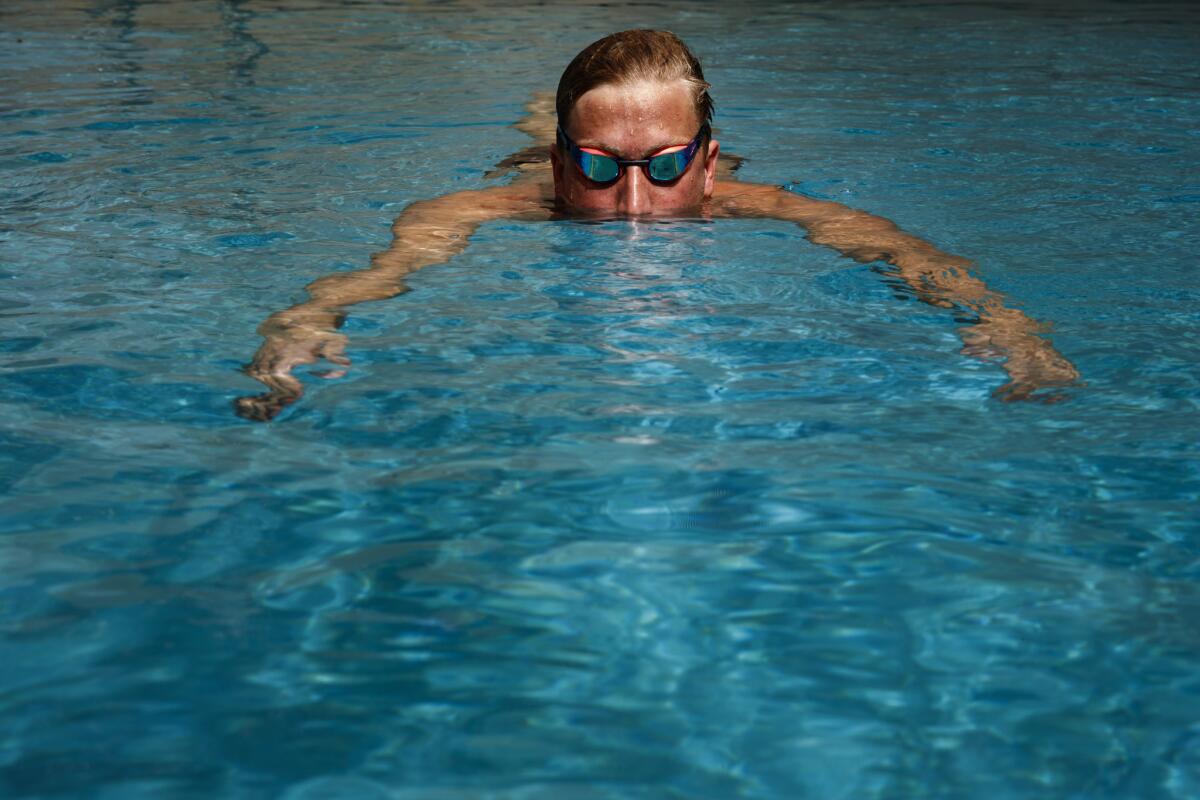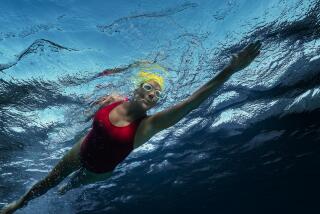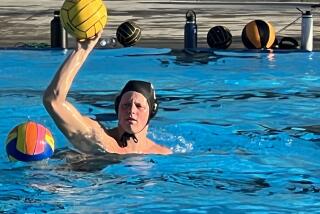Column: Jordan Wilimovsky has taken the long route -- marathon swimming -- to the Rio Olympics

Swimmer Jordan Wilimovsky will be going to the Rio Olympics after winning the men’s 10K open water race at the 2015 FINA World Championships.
The reigning men’s world champion in 10-kilometer open-water swimming — also the first U.S. swimmer to qualify for the Rio de Janeiro Games — failed the first swim test he ever took.
Jordan Wilimovsky of Malibu was 9 and wanted to join his friends at a summer lifeguard camp. He knew how to swim but had never taken lessons. “It was the junior lifeguard camp they have on L.A. County beaches every summer,” he said. “I tried to do the swim test and I didn’t make the time.”
Hoping to get below the 100-yard standard of 1 minute 50 seconds, Wilimovsky joined a team. He made the cut but didn’t immediately take to the sport. “I was very bad at swimming for a long time. I would not call myself naturally talented at swimming,” he said. “I put in a lot of hours and stuff before I started getting better.”
His journey from slow-churning beginner to world champion is remarkable, especially considering he’s among the smallest competitors at 5 feet 9 and 150 pounds. “Of all of the athletes I’ve had who have gone on to qualify for the Olympics, if you stand them up end to end, he’s an exception,” said his club coach, Dave Kelsheimer of Team Santa Monica, who has coached in Australia and guided Cayman Islands swimmers to the Olympics. “He’s definitely not the tallest guy, but he’s a massively hard worker.”
Wilimovsky, 22, is an academic all-Big Ten and academic All-American selection at Northwestern, though he’s taking an Olympic redshirt to train for Rio. He’s almost shy about discussing his feats, content to let his performances speak for him.
“He’s the best in the world at what he does, but when you talk to him you’d never know it,” said Jarod Schroeder, his coach at Northwestern. “When he’s at a meet, he doesn’t come off as a guy who’s walking around deck as the superstar. Eyes are on him, but he doesn’t notice that or doesn’t feed off of that. But when he dives in the water, he gets it done.”
There’s no secret to his success, Wilimovsky said, other than setting goals that are progressively more difficult. He’s continuing that by trying to earn a Rio berth in the 1,500-meter freestyle pool event. No U.S. swimmer has done that double; Tunisia’s Oussama Mellouli in 2012 became the first swimmer from any country to win medals in the pool (bronze in the 1,500) and open water (gold) in the same Games.
Wilimovsky has a legitimate shot — and he has less pressure because he has the marathon swim berth. Last month he swam the best 1,500 time by an American this year and sixth-best in the world, 14:53.12. If he makes it he’d swim the 1,500 on Aug. 12 and, if he advances, again the next day. The open-water 10K will take place Aug. 16 at Copacabana Beach. His winning time at worlds last year was 1 hour 49 minutes 48.2 seconds, an almost unheard-of 12 seconds ahead of Ferry Weertman of the Netherlands. Sean Ryan of Club Wolverine also earned a U.S. Olympic berth by finishing fourth; USC alumna Haley Anderson, second in the women’s Olympic 10K in 2012, finished ninth and made the women’s team.
“I like the 1,500 because you’re racing yourself and a time, and I like open water because it’s like a race you can win,” Wilimovsky said. “Open water is also fun because you get to step away from the pool and go to nice beaches.”
Wilimovsky’s success is as unlikely as it is hard-earned. When he and Kelsheimer met in 2010, Kelsheimer knew the then-Malibu High student had been a junior Olympic semifinalist but “was not the guy that anybody was excited about” in the Team Santa Monica program. That changed after Kelsheimer told the swimmers they’d have to work as hard as, or harder than, those who were most successful.
“He came out of that meeting and said, ‘Let’s do this. If it’s 12 times a week, whatever it takes,’” Kelsheimer said. “He doubled his training time and began to work extremely hard, and within nine months he went from never qualifying for a junior nationals to being ranked in the top 10 and then [in 2012] he broke the junior national record.”
To build his endurance Wilimovsky does 10 workouts a week totaling 70,000 to 90,000 meters (roughly 44 to 56 miles) and two weight sessions. “Sometimes, if you’re focusing on a stroke correction, you don’t really notice how far you go,” he said. “It just kind of goes by.”
He makes it sound easier than it is. “He’s the type of kid where I can kick his butt in practice with a very hard workout and he’ll leave practice and say, ‘Thanks,’” Schroeder said. “I love that attitude. He wants to be challenged. He thrives off that challenge. I’ve never seen the kid have two bad practices in a row.”
Despite reports of sewage and refuse polluting the water at the Rio venues, Wilimovsky said he’s not afraid to swim there. “We took a site visit in January and they tested the water when we were down there. It’s not dirty,” he said. “They said it’s the same as some of the L.A. beaches. I don’t think somebody’s going to put us in water that’s going to be harmful to us. I think we’ll be all right.”
His medal chances are difficult to predict. “Open water is just like any race where it’s anything can happen. I don’t really focus on who I’m racing,” he said. “I just try and stick to my same race strategy.”
It’s tough to argue with an approach that has gotten him from that failed test to the top of the distance swimming world.
helene.elliott@latimes.com
Twitter: @helenenothelen
More to Read
Go beyond the scoreboard
Get the latest on L.A.'s teams in the daily Sports Report newsletter.
You may occasionally receive promotional content from the Los Angeles Times.






